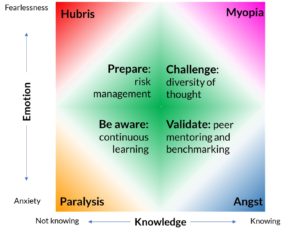Conventional wisdom says we want our leaders to be decisive, confident and certain. Whether politician or business leader, we’re reassured by their communication of a clear vision and how it will be achieved.
But our desire for certainty has drawbacks.
“We mistake charisma and confidence for competence” says Tomas Chamorro-Premuzi in Why Do So Many Incompetent Men Become Leaders? (And How to Fix It).
I’m pretty sure you can think of someone whose popularity exceeds their performance, whose presentation outweighs their contribution, and whose over-optimistic confidence leaves no room for nuance and reason.
So if the opposite of certainty is doubt, can we use it productively?
This is an area explored by Nicola Reindorp in her blogposts and BBC Four Thought podcast. She argues that doubt has valuable place and should not be seen as the enemy:
Doubt is at the heart of self-awareness
Reflecting on how others might see your behaviour and questioning yourself on how can you be better is fundamental to emotional intelligence. This openness to change and other perspectives is driven by accepting self-doubt.
Doubt is the bedrock of critical thinking
Daniel Kahnemann’s book Thinking Fast and Slow exposed how the brain takes shortcuts, bamboozled by emotion and looking for easy answers. It takes doubt to question your thinking, to test the evidence and look for alternatives.
Doubt drives a collaborative approach
If you think you may not have all the answers, then you’re more likely to be collaborative. If you know your perspective is just one of many, then you’re opening the door to a more diverse and inclusive thinking process.
Make doubt work for you
Reindorp stresses that the key is to use a cycle of analysis to work through your doubts and not to get overwhelmed by them. Avoid the negative aspects of doubt by setting a limited time and space for rational exploration of the issues using thought exercises and models.
This approach of focusing on rational processes can be seen in the following diagram, which I have adapted from The CEO Report – Embracing the paradoxes of leadership and the power of doubt from Said Business School. Avoid the negative factors – Hubris, Myopia, Angst and Paralysis – by focusing on four structured rational processes: Preparation, Challenge, Validation, and Awareness.
“Doubt is not a pleasant condition, but certainty is an absurd one.” Voltaire






